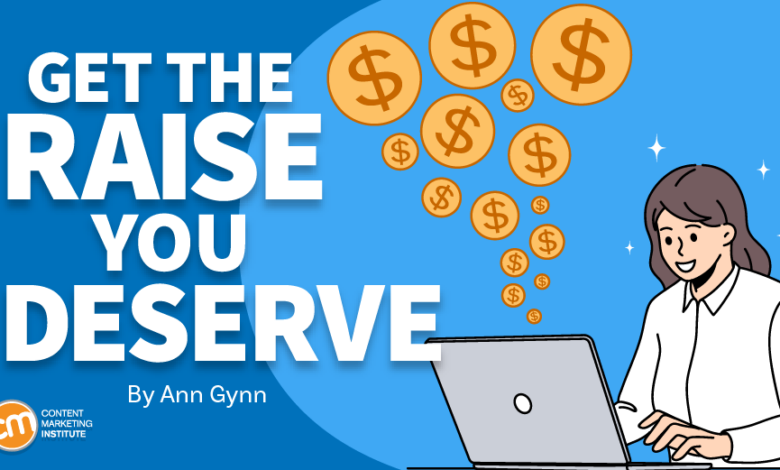How to advocate for increasing your content and marketing role

You are underpaid for the marketing work you do.
That’s the sentiment of marketers surveyed for CMI Career Outlook 2025: Content and Marketing Professionals (registration required).
How underpaid are marketers? About 20%.
That’s a lot of money, considering the survey finds that marketers in the United States earn an average of $108,380 per year, 3% less than the previous year.
So how do you get this 20%? Well, the best advice to get such a huge raise is to change jobs. Few companies will pay you 20% more in 2025 than in 2024 for the same work.
But that doesn’t mean you have to accept what you earn now. You can take action now. How to ask for and get a realistic raise? Do your research. Prepare the file and present it effectively.
Do external research
Just like you do with your content marketing, you need to research the market. What do other people in similar positions in similar industries earn?
Fortunately, you live in a time of salary transparency laws and a global economy. California, Colorado, Connecticut, Maryland, Nevada, and many cities, including New York, require companies to post salary ranges in their job postings. In some cases, large companies now include salary ranges in all their postings, likely to ensure compliance with a potential law.
Search job postings on LinkedIn, industry job boards, and job boards to see what compensation is on offer. By using job postings, you can also better understand whether your responsibilities match, or are at least similar to, what the employer is asking for in the job posting.
From there, you can move on to salary benchmark reports. Although more general than individual job postings, they provide cumulative and credible research.
As mentioned, CMI research reveals that the average American marketer earns $108,380 per year. But when configured for large urban centers, such as Boston and San Francisco, and all other locations, the numbers differ. The average rate in large urban centers is $122,265, while in other locations the average salary is $93,737.
When we break down salaries into functions, other differences emerge. Directors and above earn an average of $146,901, while the average for managers is $102,914 and individual positions earn an average of $89,455.
Another option is to use the salary tool from the Creative Circle recruitment agency. When you select a job title and location, the tool reveals both the average salary and the desired salary, based on what candidates say they want. All data comes from Creative Circle clients and candidates.
Prepare internally
Of course, pretending that you should get a raise because everyone is making more money won’t get you anywhere.
You need to be specific about your work situation and ask these questions:
Is my employer doing well? The CMI study finds that 33% of marketers say their company has laid off staff in the last year. If this is you, a raise is unlikely unless your role has expanded significantly. However, if you are part of the majority who have not been laid off, a raise might be possible.
How does content and marketing affect the business? The greater the impact content and marketing has on the bottom line, the more likely you can justify an increase.
Once the macro factors have been identified, you now need to think about your role and your job.
Nikola BaldikovCEO and Founder of Inbound Blogging, says it’s all about showing the difference you’ve made.
Start with clear examples of your achievements supported by measurable results. “These are the kind of wins that directly connect your work to the success of the company. It is important to emphasize your determination to achieve results,” says Nikola.
I suggest every employee create a bulleted list. In this document, you paste positive feedback, measurements and results of your work when you receive them. This way, whenever you’re ready to argue for a pay raise (or update your resume), you can incorporate the most important and relevant points into your formal request.
Nikola emphasizes that one must not forget to look to the future in one’s advocacy. Detail any new tools or skills, such as AI, you’ve acquired and show how they can help improve performance and bring more value to your role.
With this external, internal, and personal research, you’re almost ready to pop the question. But it’s useful if you’ve already executed this next idea.
Build a bench of supporters
Steve Roseproduct manager and former vice president at Intent, offers a tip to help you prepare your case: “Aggressively cultivate your support base. Having someone else advocate for you can go a long way in demonstrating your worth.
But don’t wait until the last minute. “Proactively build these connections over time,” says Steve. “If they feel comfortable, ask one or two of them to send a statement to your boss about your progress and improvements.”
Or if that seems too intimidating, ask the people you work with for recommendations on your LinkedIn profile and get what you need for your salary application later.
Prepare for the conversation
Do not make this request for personal reasons; highlight the value you’ve added to the company, says Jay Eggersenior executive at SBG Funding.
“Also understand that often your direct manager is not the only one making the decision, so the goal should be to make it easier for them to sell the decision,” says Jay.
Even a well-researched request can seem distressing, so rehearse the conversation. “Most people shudder at the thought of approaching their boss about a pay raise, says Vaibhav KakkarCEO of Digital Web Solutions. It offers this prompt to help you get started:
“As you know, I just finished my (X) year with (organization). I look forward to continuing to work toward the company’s goals in my current role and expanding my role. Based on this, let’s talk about my salary.
Don’t let the employer make an offer; make a specific request based on your search. Be realistic. If you have the same responsibilities, a 3% increase is typical. “Anything above 5% is remarkable,” says Vaibhav.
If your job duties have expanded or circumstances have changed (for example, a job with minimal travel becomes a job with 50% travel), a higher rate of 10 to 20% might be possible, he says.
If you remain in the same role and responsibilities but your research indicates a significant gap between the industry standard average rate and your compensation, schedule a more in-depth conversation. The gap within the industry likely exists for other roles as well. A significant change in your salary would likely cause your employer to have to address other underpaid positions as well.
Remember not to make the request solely about the past or even the current situation. “Share your vision for how you will continue to deliver results, whether it’s new campaign ideas or new ways to take on greater responsibilities. Showing that you are focused on the future of the company is a great way to strengthen your case,” says Nikola.
Also be aware that your supervisor is unlikely to approve your request during your first conversation. They may need to review their budget, think about what you shared, or have a conversation with their boss.
So at the end of the conversation, set expectations for follow-up, says Adam Crosslingmarketing and new business director at Zenzero.
Acknowledge that you understand that the supervisor probably cannot approve your request at this time. Then indicate that you will check in a week or two later. This is an additional way to direct the process rather than adopting a wait-and-hope strategy.
Earn the raise and plan for the alternative
Allison Gagliardi, director of legal content at PaperStreet Web Design, has a successful history of asking for pay raises. At two previous employers, she asked for 10% raises during her annual reviews and got them.
How did she do it? She wrote a letter describing her compensation request and listed her accomplishments to date in bullet points. She signed the letter – with a real pen – and put it in a double-pocketed folder. In the other pocket, she included emails/letters from clients and colleagues singing her praises. “It’s evidence they just can’t argue with,” Allison says.
Alllison advises all marketers asking for a pay raise to have an answer ready if the answer is no. Ask for additional paid time off, suggest a bonus for reaching a specific level, get permission to bring a pet into the office on certain days, or ask for a standing desk, an upgraded title, a continuing education plan, or even the control of the air conditioning unit in your department (yes, for real).
Prepare for next time
If you don’t get the raise (or even if you do), Anthony Miyazakiprofessor of marketing at Florida International University, suggests three things you can do (or continue to do) to demand higher pay, get promoted or get hired.
Intensify your training in consumer psychology. Understand how and when different types of persuasive appeals will work to push an audience in a certain direction.
Connect your work to marketing KPIs. You need to understand marketing analytics and its role in determining the value of marketing efforts such as advertising campaigns and content creation.
Combine your knowledge of marketing analysis and your human ability to create persuasive content present compelling arguments, including compelling data visualizations, to decision-makers.
What do you think? Is now a good time to ask for a raise? How to convince your superiors? Let us know on social media.
Updated from a November 2022 article.
If you are recruiting, send details of your open position to [email protected]and we will add it to our Content Marketing Jobs page.
HANDPICKED RELATED CONTENT:
Cover image by Joseph Kalinowski/Content Marketing Institute



